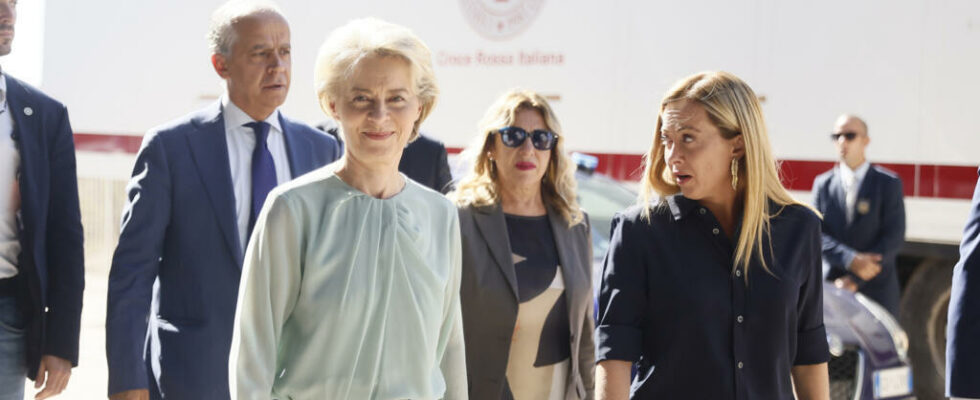This would be a significant shift for the European Union: the European Commission wants to consider sending illegal migrants back to – and this would be a first – third countries. Its president, Ursula von der Leyen, wrote to the 27 to propose the opening of “hubs”.
4 mins
It is written in black and white: “ we need to think about the idea of developing return centers outside the EU », writes the President of the European Commission. She takes the example of the migrant transfer agreement between Italy and Albania to, she says, “ learn from this experience “. Until now, these “hub” projects were only defended by countries governed by the far-right: Italy or Hungary. And there, it is the head of the European executive herself who officially proposes it to the 27 countries of the Union.
This is clearly a turning point for European migration policy, a barrier has been broken.
Ursula von der Leyen will talk about it on Thursday and Friday during a European Council devoted to migration. Giorgia Meloni has already planned to organize a meeting on the sidelines of this summit with the countries most interested in her agreement with Albania. The head of the Italian government who welcomed this Tuesday the “courageous” agreement concluded with Albania.
Italy set a good example by signing the Italy-Albania protocol to process asylum requests on Albanian territory, but under Italian and European jurisdiction. The two structures provided for by the protocol, the Shengjin center and the Gjader center, are now ready and operational. It is a new, courageous, unprecedented path, but which perfectly reflects the European spirit and is in order to be undertaken also by other countries outside the EU.
Giorgia Meloni: a “courageous” agreement
This inflection is not entirely a surprise. The EPP, the European People’s Party, Ursula von der Leyen’s political party, already supported the idea of these return centers outside the borders of the EU.
The idea is not new: sending migrants back to third countries, the United Kingdom wanted to do this with Rwanda but the agreement was never implemented. Several countries were in favor of this idea, including France through its new right-wing Minister of the Interior, Bruno Retailleau.
Italy is therefore in the process of putting into practice this hub project with Albania: 16 migrants from Bangladesh and Egypt are currently sailing towards the Albanian coasts.
Also readItaly transfers first group of migrants to its centers in Albania
The climate is closing borders in Europe
L’Germany has reinstated controls upon entry into the country, Poland wants to partially suspend the right to asylum. And this in a political context of the surge of the far-right in the last European elections. Anti-migrant groups have never been so strong in the European Parliament.
Ursula von der Leyen is forced to deal with them to get texts across. A tacit agreement already exists in Parliament with the CRE, the Conservatives and Reformists group of the Italian nationalist Giorgia Meloni.
Also readWith the arrival of a far-right Italian elected official, the European Commission takes a decided turn to the right
For the French MEP from the Socialist Party, François Kalfon, a barrier has clearly been broken: “ The political obstacle, as we can clearly see, Madame von der Leyen has alliances of variable geometry. It’s a floating cork. This traffic jam is moving further and further to the right of the basin, even if it means calling into question the values. Obviously, a lock is being blown. »
In her letter, Ursula von der Leyen therefore proposes a new law to facilitate the expulsion of illegal migrants. But adopting this text will take time. To review what is called the “return directive”, it will take several back and forths between the Commission and member countries.
And even if the left does not have the keys to the EU Parliament, it will do everything to sabotage the text.
It should also be remembered that the European Union has already tightened its rules not so long ago: the Asylum and migration pact adopted last May, must come into force in mid-2026, toughens controls and establishes a solidarity mechanism between the 27 for asylum seekers.
But faced with the current weight of the far-right in Brussels and elsewhere in Europe, the EU is taking an even more repressive direction on immigration.
And this while the figures show that the current rules are working: illegal crossings at EU borders down 42% since January according to the Frontex agency.
